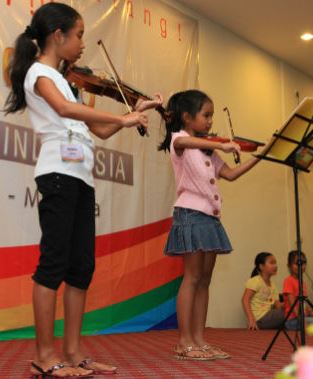
Jun 15, 2016 | Focolare Worldwide, Senza categoria
 The crisis of the refugees in Europe, along with its figures, the number of deaths, and the closed frontiers, is awaiting the world’s response, as well as that of many generous people. The news from Indonesia comes as the answer of the Youth for a United World in the city of Medan, Indonesia (four million inhabitants). “We could not turn a deaf ear to the refugees camped in Greece, and we wanted to do something concrete for them. So we decided to plan our United World Week 2016 by organizing a concert to gather funds for them. It was our way of giving strong affirmation that peace is possible and starts from each of us, with concrete actions.” “We had two weeks to prepare the event, which was not much, but we thought that we would succeed if we worked hard, forgetting our fatigue and economic difficulties. To cover the organisational expenses we sang even in restaurants. But God’s Providence came to our aid and we managed to pay for the lease of a hall, part of the sound system and other items.” “When I saw all those young people in the audience – says Ika – I tried not to think of myself but of the refugees, and took courage. “From the technical viewpoint – some confessed with great simplicity – «we made so many mistakes, but the atmosphere of enthusiasm and joy of the 350 participants convinced us that it was all worth the while!” Even a choir of four singers of a Catholic University wanted to contribute to the peace concert.” “The proceeds of € 600 correspond to three or four months’ basic salary in Indonesia, which is not much, but we were so happy that we managed to give our drop of help for our brethren in difficulty.” “It was an extraordinary experience – stressed Randi – I strongly felt that the differences in religions and ethnic groups are in reality very meaningful. I hope that many hearts have been touched and start loving with concrete gestures.” “On a wall poster entitled “Let’s bridge,” the participants signed up with their commitment to build peace.”
The crisis of the refugees in Europe, along with its figures, the number of deaths, and the closed frontiers, is awaiting the world’s response, as well as that of many generous people. The news from Indonesia comes as the answer of the Youth for a United World in the city of Medan, Indonesia (four million inhabitants). “We could not turn a deaf ear to the refugees camped in Greece, and we wanted to do something concrete for them. So we decided to plan our United World Week 2016 by organizing a concert to gather funds for them. It was our way of giving strong affirmation that peace is possible and starts from each of us, with concrete actions.” “We had two weeks to prepare the event, which was not much, but we thought that we would succeed if we worked hard, forgetting our fatigue and economic difficulties. To cover the organisational expenses we sang even in restaurants. But God’s Providence came to our aid and we managed to pay for the lease of a hall, part of the sound system and other items.” “When I saw all those young people in the audience – says Ika – I tried not to think of myself but of the refugees, and took courage. “From the technical viewpoint – some confessed with great simplicity – «we made so many mistakes, but the atmosphere of enthusiasm and joy of the 350 participants convinced us that it was all worth the while!” Even a choir of four singers of a Catholic University wanted to contribute to the peace concert.” “The proceeds of € 600 correspond to three or four months’ basic salary in Indonesia, which is not much, but we were so happy that we managed to give our drop of help for our brethren in difficulty.” “It was an extraordinary experience – stressed Randi – I strongly felt that the differences in religions and ethnic groups are in reality very meaningful. I hope that many hearts have been touched and start loving with concrete gestures.” “On a wall poster entitled “Let’s bridge,” the participants signed up with their commitment to build peace.”

Jun 14, 2016 | Focolare Worldwide
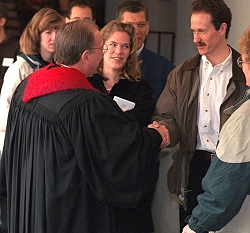 Pastor of Mercy “To begin the Year of Mercy with a concrete gesture, I asked forgiveness of the members of my parish in case they didn’t always feel loved by me, and I invited them – those who wanted to – to come up and shake hands with me as a sign of our agreement to see each other with new eyes. A long queue was formed, and I was able to exchange a few words with every person. The next day, a parishioner who had not been there came to ask me if I would repeat the gesture because it had touched so many people in the village that it was still having lots of consequences.” (I. S. Hungary) Sharing “I’m nearly blind. The person who helps me to study had given me 1.220 shillings to buy the medicine against malaria. On the way to the pharmacy I met a poor woman who told me about her need. To help out, I gave her 200 shillings. Shortly afterwards, in front of the pharmacy I met another woman who was in dire financial straits: She didn’t have the money to buy the medicine that was necessary for her. I saw Jesus in her as well. So another 200 shillings went to her. But now I was short 400 shillings for my own medicine. Certain that God wouldn’t fail to help me in my need, I went into the pharmacy just the same. Inside I met a friend whom I hadn’t seen in a long time. I shared my need with him and he insisted on giving me 500 shillings: more than what I needed.” (R. S. Tanzania) At the Public Washhouse “Many of us were washing clothes at the public washhouse when a blind man arrived with two bed linens, a shirt and a turban that needed to be washed. I asked that we make room for him. Since no one wanted to move, I turned to him and said: “Baba, give me your things. I’ll wash them.” The others began to laugh. Before going away, pleased with the washing I had done, he gave me his blessing and also a small piece of soap that he had been jealously guarding. No one laughed anymore; on the contrary, they had begun to lend things to each other and offer help to one another.” (F. R. – Pakistan)
Pastor of Mercy “To begin the Year of Mercy with a concrete gesture, I asked forgiveness of the members of my parish in case they didn’t always feel loved by me, and I invited them – those who wanted to – to come up and shake hands with me as a sign of our agreement to see each other with new eyes. A long queue was formed, and I was able to exchange a few words with every person. The next day, a parishioner who had not been there came to ask me if I would repeat the gesture because it had touched so many people in the village that it was still having lots of consequences.” (I. S. Hungary) Sharing “I’m nearly blind. The person who helps me to study had given me 1.220 shillings to buy the medicine against malaria. On the way to the pharmacy I met a poor woman who told me about her need. To help out, I gave her 200 shillings. Shortly afterwards, in front of the pharmacy I met another woman who was in dire financial straits: She didn’t have the money to buy the medicine that was necessary for her. I saw Jesus in her as well. So another 200 shillings went to her. But now I was short 400 shillings for my own medicine. Certain that God wouldn’t fail to help me in my need, I went into the pharmacy just the same. Inside I met a friend whom I hadn’t seen in a long time. I shared my need with him and he insisted on giving me 500 shillings: more than what I needed.” (R. S. Tanzania) At the Public Washhouse “Many of us were washing clothes at the public washhouse when a blind man arrived with two bed linens, a shirt and a turban that needed to be washed. I asked that we make room for him. Since no one wanted to move, I turned to him and said: “Baba, give me your things. I’ll wash them.” The others began to laugh. Before going away, pleased with the washing I had done, he gave me his blessing and also a small piece of soap that he had been jealously guarding. No one laughed anymore; on the contrary, they had begun to lend things to each other and offer help to one another.” (F. R. – Pakistan)  Failed divorce “It wasn’t easy to make Susanna accept my decision to ask for a divorce, especially because I intended to move to another city with the woman I had begun a new relationship with. After the initial refusal my wife’s attitude changed. I was shocked by her great dignity and didn’t understand where she was getting the energy to treat me so well in spite of my betrayal. This thought took away my peace. One day I invited her out for lunch at a restaurant: I wanted to know. With simplicity she confided to me that she had discovered God’s love through a group of several Christian friends she had met. God always loves us despite our infidelities, and He’s close to us in the hardships of life. That’s all it took to make me change my idea. Susanna and I had begun again.” (L. M. USA)
Failed divorce “It wasn’t easy to make Susanna accept my decision to ask for a divorce, especially because I intended to move to another city with the woman I had begun a new relationship with. After the initial refusal my wife’s attitude changed. I was shocked by her great dignity and didn’t understand where she was getting the energy to treat me so well in spite of my betrayal. This thought took away my peace. One day I invited her out for lunch at a restaurant: I wanted to know. With simplicity she confided to me that she had discovered God’s love through a group of several Christian friends she had met. God always loves us despite our infidelities, and He’s close to us in the hardships of life. That’s all it took to make me change my idea. Susanna and I had begun again.” (L. M. USA)
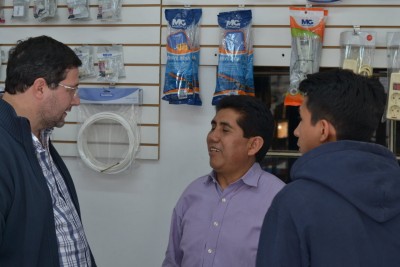
Jun 13, 2016 | Focolare Worldwide
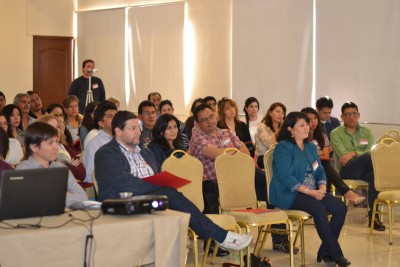 “Cochabamba is really the heart of the country, the fourth largest city of Bolivia, located in a fertile valley surrounded by the Andes Mountains. The journey is already preparing me to overcome my own personal mountains and take the leap of leaving behind my culture, presumptions and prejudices so that I can be sufficiently disposed to grasp the beauty of this experience where each of us wishes to be a gift for the other.” “On the morning of the 26th we visit the Old City, which has a traditional air about it and conserves many colonial images that can be found in the numerous temples and in the large villas. In the afternoon we visit the Universidad Católica Boliviana San Pablo for a meeting with 70 young people from different departments. Discussions of theory follow experiences that are preceded by a group exercise by Aldo Calliera who invites us to find our true north because – he says – the world has lost its compass. For us in the Economy of Communion, our north is the other person.” The 1st Conference for EoC business owners began on May 27th and I was fortunate to attend, watching and listening so that I could tell about the extraordinary event that was made up of the stories of many businesses that, day in, day out are putting their money on communion.” In his welcome speech Argentinian business owner, Ramón Cerviño, reminds us that we’ve come for an experience of communion, because communion is the true wealth of the EoC.” “The programme takes us to the very roots of the charism of unity to rediscover the origins of the EoC.
“Cochabamba is really the heart of the country, the fourth largest city of Bolivia, located in a fertile valley surrounded by the Andes Mountains. The journey is already preparing me to overcome my own personal mountains and take the leap of leaving behind my culture, presumptions and prejudices so that I can be sufficiently disposed to grasp the beauty of this experience where each of us wishes to be a gift for the other.” “On the morning of the 26th we visit the Old City, which has a traditional air about it and conserves many colonial images that can be found in the numerous temples and in the large villas. In the afternoon we visit the Universidad Católica Boliviana San Pablo for a meeting with 70 young people from different departments. Discussions of theory follow experiences that are preceded by a group exercise by Aldo Calliera who invites us to find our true north because – he says – the world has lost its compass. For us in the Economy of Communion, our north is the other person.” The 1st Conference for EoC business owners began on May 27th and I was fortunate to attend, watching and listening so that I could tell about the extraordinary event that was made up of the stories of many businesses that, day in, day out are putting their money on communion.” In his welcome speech Argentinian business owner, Ramón Cerviño, reminds us that we’ve come for an experience of communion, because communion is the true wealth of the EoC.” “The programme takes us to the very roots of the charism of unity to rediscover the origins of the EoC.  Thus, we go to visit the Centro Rincón de Luz, a social project that offers academic support to children living in a very poor quarter. Their families don’t always manage to assist them in their school work. They live in small huts of one or two rooms, often under-nourished and even beaten . . . Maricruz, who is now one of the directors, was once herself one of those children. Solidarity begets more solidarity. The virtuous circle of reciprocity is key to responding to such concrete social problems.” “We also visit the Casa de los Niños. Chiara Lubich had once shared that she wished that one day all orphanages could be closed and every child enjoy the warmth and love of a family. Many people like Arístides began to follow her dream and got to work wherever and however they could, providing temporary lodging and support for the families of those children who suffer the greatest abandonment, the ones afflicted with AIDS. In the recent years, with the help of others, they’ve been able to offer dignified lodging to a hundred families. In spite of the suffering of those families, many of them HIV positive, the beauty of the little village shows that it’s possible to embrace innocent suffering and fill it with joy, games, flowers and a spirit of hope.” “In the meeting among Mexican, Paraguayan, Argentinian and Bolivian business owners we share our dreams, failures and successes. A special meeting is held on May 28th at the Gran Hotel Cochabamba, with 120 people including business owners, students, experts, officials and people interested in knowing more about a new culture for the economy. Sunday, May 29th is a day of feasting: It’s the 25th anniversary of the Economy of Communion! There is singing, dancing, local foods and much sharing.” “Thank you Bolivia for having helped me to rediscover my true north where Heaven and earth seem to mingle.” Source: Website Cono Sur
Thus, we go to visit the Centro Rincón de Luz, a social project that offers academic support to children living in a very poor quarter. Their families don’t always manage to assist them in their school work. They live in small huts of one or two rooms, often under-nourished and even beaten . . . Maricruz, who is now one of the directors, was once herself one of those children. Solidarity begets more solidarity. The virtuous circle of reciprocity is key to responding to such concrete social problems.” “We also visit the Casa de los Niños. Chiara Lubich had once shared that she wished that one day all orphanages could be closed and every child enjoy the warmth and love of a family. Many people like Arístides began to follow her dream and got to work wherever and however they could, providing temporary lodging and support for the families of those children who suffer the greatest abandonment, the ones afflicted with AIDS. In the recent years, with the help of others, they’ve been able to offer dignified lodging to a hundred families. In spite of the suffering of those families, many of them HIV positive, the beauty of the little village shows that it’s possible to embrace innocent suffering and fill it with joy, games, flowers and a spirit of hope.” “In the meeting among Mexican, Paraguayan, Argentinian and Bolivian business owners we share our dreams, failures and successes. A special meeting is held on May 28th at the Gran Hotel Cochabamba, with 120 people including business owners, students, experts, officials and people interested in knowing more about a new culture for the economy. Sunday, May 29th is a day of feasting: It’s the 25th anniversary of the Economy of Communion! There is singing, dancing, local foods and much sharing.” “Thank you Bolivia for having helped me to rediscover my true north where Heaven and earth seem to mingle.” Source: Website Cono Sur
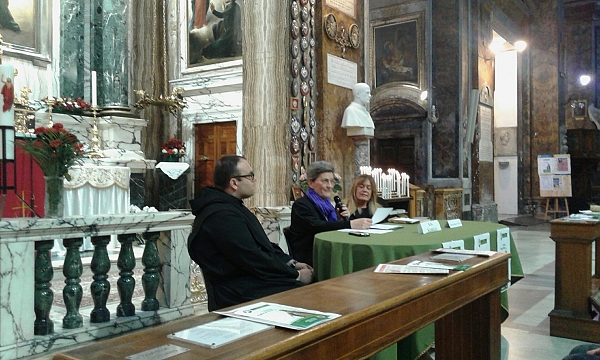
Jun 12, 2016 | Non categorizzato
 “Merciful Like the Father” is the motto chosen by Pope Francis to summarize what the Year of Mercy is all about. “In mercy,” the Bull of Indiction declares, “we find proof of how God loves us. He gives his entire self, always, freely, asking nothing in return. He comes to our aid whenever we call upon him. (…) And his help consists in helping us accept his presence and closeness to us” (MV, 14). It is this Face of Love-Mercy that fully reveals the Fatherhood of God. God is Love was the inspirational spark that lay at the origins of the charism of unity which the Holy Spirit bestowed on Chiara Lubich in our time (…) Chiara therefore does not show us a God who is far away, inaccessible and foreign to our existence, but a God with a fatherly face (…) So, everything that happens can be seen as the fulfilment of his loving plan for each one of us, as the tangible proof of his watchful care, of his closeness. “Even the very hairs of your head are all counted” (Mt 10:30). This is a fatherly love that anticipates every need, even the smallest, even filling the void left by our small and great imperfections, by our shortcomings and our sins. It is the face of the merciful Father who manifests himself and fully reveals his merciful love through the incarnate Son. Episodes from the Gospel. The magisterial documents that deal with the topic of mercy always cite the Gospel passages that best illustrate it. A classic example is the story of the Prodigal Son (Lk 15:11-32) (…) One day, Chiara found herself talking about this parable in front of a large crowd of young people in the Dome Church of Paderborn, Germany. It was June 12, 1999. Here is what she said to them: “The father of the prodigal son would have had many things to do: Look after the business, the employees, the family; but his main attitude is his longing for the son who had taken off. He goes to the top of the tower of his house and looks out as far as he can see. The Heavenly Father is like this: imagine if you can, dear young people, his divine, most high and dynamic Trinitarian life, how He is constantly engaged in sustaining all creation, in giving a place to those who are going up to Heaven. And yet, above it all, He does one thing especially: He waits. For whom? For us, me, all of you, especially when we find that we’re far from Him. One fine day that son, whom the earthly father loved so much, returned after having squandered everything. The father takes him into his arms and hugs him, covers him in a valuable robe, has the fatted calf prepared for a feast. What must we think? That he longs to see his son all new; he doesn’t want to remember him as he first was. And not only does the father long to forgive him, but even to forget about his past. This is his love for the son in this parable. This is the love of the Father for us in this life: He always forgives us and forgets.” Source: Centro Chiara Lubich Complete text by Alba Sgariglia (Italian)
“Merciful Like the Father” is the motto chosen by Pope Francis to summarize what the Year of Mercy is all about. “In mercy,” the Bull of Indiction declares, “we find proof of how God loves us. He gives his entire self, always, freely, asking nothing in return. He comes to our aid whenever we call upon him. (…) And his help consists in helping us accept his presence and closeness to us” (MV, 14). It is this Face of Love-Mercy that fully reveals the Fatherhood of God. God is Love was the inspirational spark that lay at the origins of the charism of unity which the Holy Spirit bestowed on Chiara Lubich in our time (…) Chiara therefore does not show us a God who is far away, inaccessible and foreign to our existence, but a God with a fatherly face (…) So, everything that happens can be seen as the fulfilment of his loving plan for each one of us, as the tangible proof of his watchful care, of his closeness. “Even the very hairs of your head are all counted” (Mt 10:30). This is a fatherly love that anticipates every need, even the smallest, even filling the void left by our small and great imperfections, by our shortcomings and our sins. It is the face of the merciful Father who manifests himself and fully reveals his merciful love through the incarnate Son. Episodes from the Gospel. The magisterial documents that deal with the topic of mercy always cite the Gospel passages that best illustrate it. A classic example is the story of the Prodigal Son (Lk 15:11-32) (…) One day, Chiara found herself talking about this parable in front of a large crowd of young people in the Dome Church of Paderborn, Germany. It was June 12, 1999. Here is what she said to them: “The father of the prodigal son would have had many things to do: Look after the business, the employees, the family; but his main attitude is his longing for the son who had taken off. He goes to the top of the tower of his house and looks out as far as he can see. The Heavenly Father is like this: imagine if you can, dear young people, his divine, most high and dynamic Trinitarian life, how He is constantly engaged in sustaining all creation, in giving a place to those who are going up to Heaven. And yet, above it all, He does one thing especially: He waits. For whom? For us, me, all of you, especially when we find that we’re far from Him. One fine day that son, whom the earthly father loved so much, returned after having squandered everything. The father takes him into his arms and hugs him, covers him in a valuable robe, has the fatted calf prepared for a feast. What must we think? That he longs to see his son all new; he doesn’t want to remember him as he first was. And not only does the father long to forgive him, but even to forget about his past. This is his love for the son in this parable. This is the love of the Father for us in this life: He always forgives us and forgets.” Source: Centro Chiara Lubich Complete text by Alba Sgariglia (Italian)
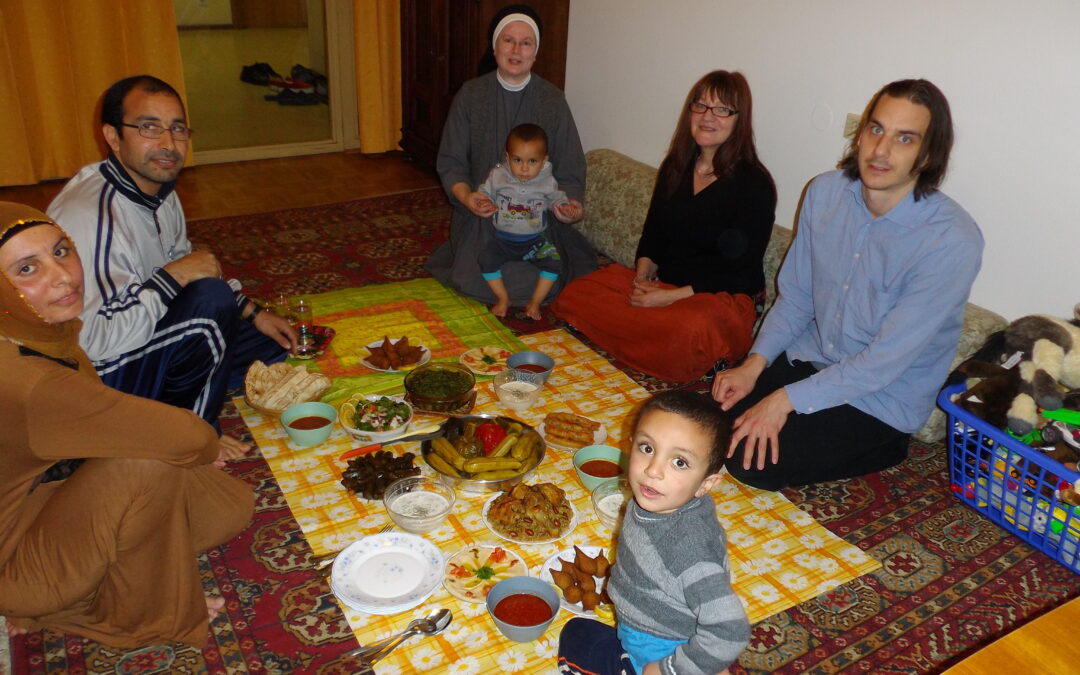
Jun 11, 2016 | Focolare Worldwide
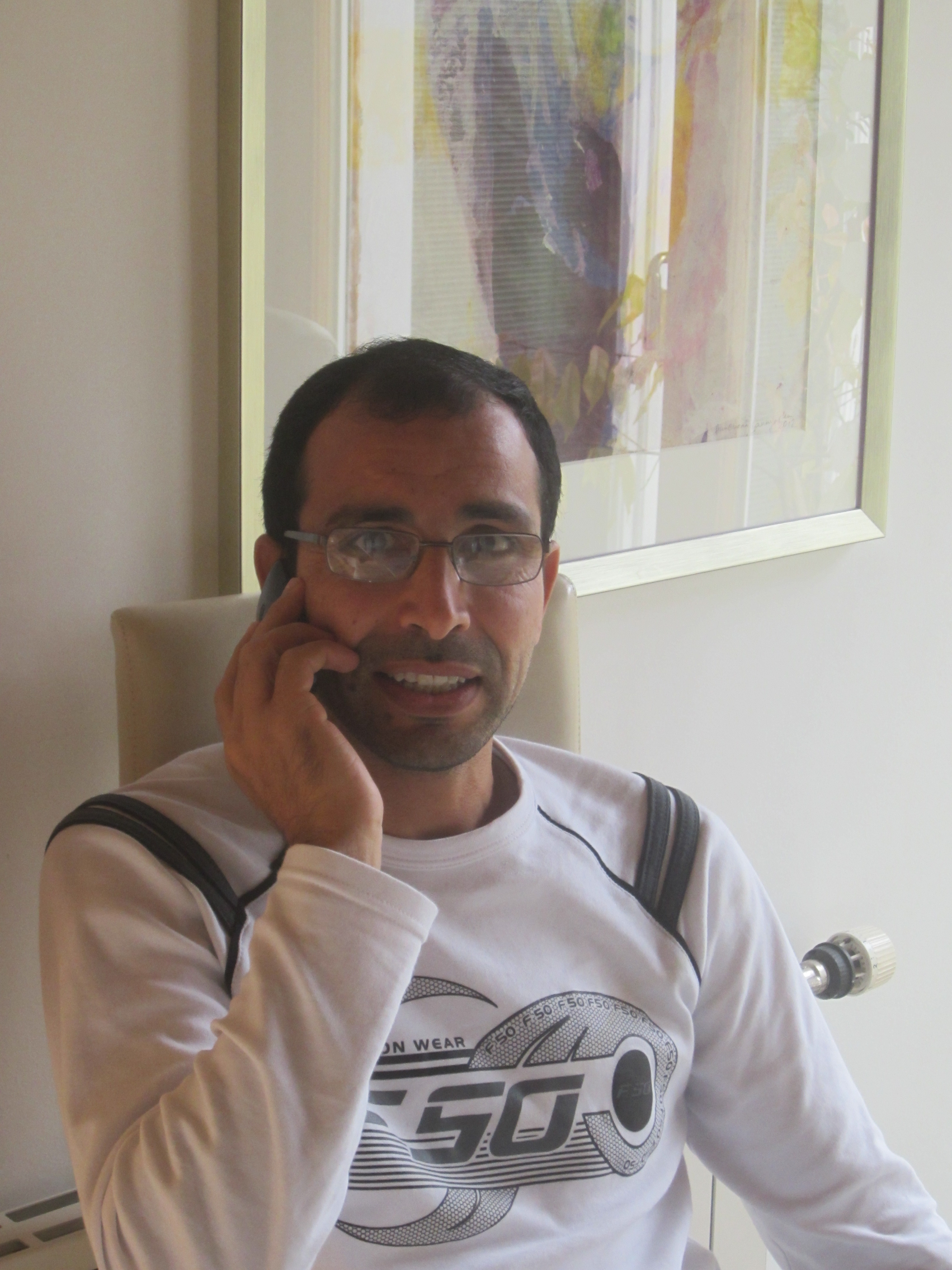 “I had to leave everything behind: my wife, two small children and my country. On the other hand, I didn’t have a choice. Being young and a teacher, I would have had to follow ISIS and spread its ideas. But since I opposed it, if I had remained there they would have murdered me.” When Mohamed reached Graz, Austria, like many other immigrants he was parked in a refugee camp, doing nothing for months and having absolutely no contact with the outside world. “We felt so isolated and depressed,” he recounts, “but then somebody did begin to show an intererst in us.” It was the local Focolare community which, through the mediation of a Syrian friend who had been living in Graz for three years, invited 40 of the Syrian refugees from the camp to to get together at a parish hall. This gave them the opportunity to present their precise needs: to learn the language and find a job. The community got to work and in a short time managed to put together a German lanugage course. Some gave money for books, one woman was able to find 15 bicycles from neighbours, which she had repaired at her own expense for the students that had to travel 10 km to attend the lessons. Others found odd jobs for them fixing up houses and doing gardening work. “We finally had something useful that we could do,” Mohamed whispered with relief. “Finally someone took us by the hand and appreciated us.” A friendship began that only deepened and became more heartfelt. It was only logical to get together, to share meals with one another and also to begin a cultural and religious dialogue. The first step was to attend the mosque together where they met many other people. Once, they were more than 400: “It was a great thing for us,” Mohamed confided. “Finally, we were able to feel like ourselves, there we could forget about what had happened to us and enter into direct contact with God. Sharing this moment with Muslims and Christians together made us feel even closer to one another.”
“I had to leave everything behind: my wife, two small children and my country. On the other hand, I didn’t have a choice. Being young and a teacher, I would have had to follow ISIS and spread its ideas. But since I opposed it, if I had remained there they would have murdered me.” When Mohamed reached Graz, Austria, like many other immigrants he was parked in a refugee camp, doing nothing for months and having absolutely no contact with the outside world. “We felt so isolated and depressed,” he recounts, “but then somebody did begin to show an intererst in us.” It was the local Focolare community which, through the mediation of a Syrian friend who had been living in Graz for three years, invited 40 of the Syrian refugees from the camp to to get together at a parish hall. This gave them the opportunity to present their precise needs: to learn the language and find a job. The community got to work and in a short time managed to put together a German lanugage course. Some gave money for books, one woman was able to find 15 bicycles from neighbours, which she had repaired at her own expense for the students that had to travel 10 km to attend the lessons. Others found odd jobs for them fixing up houses and doing gardening work. “We finally had something useful that we could do,” Mohamed whispered with relief. “Finally someone took us by the hand and appreciated us.” A friendship began that only deepened and became more heartfelt. It was only logical to get together, to share meals with one another and also to begin a cultural and religious dialogue. The first step was to attend the mosque together where they met many other people. Once, they were more than 400: “It was a great thing for us,” Mohamed confided. “Finally, we were able to feel like ourselves, there we could forget about what had happened to us and enter into direct contact with God. Sharing this moment with Muslims and Christians together made us feel even closer to one another.” 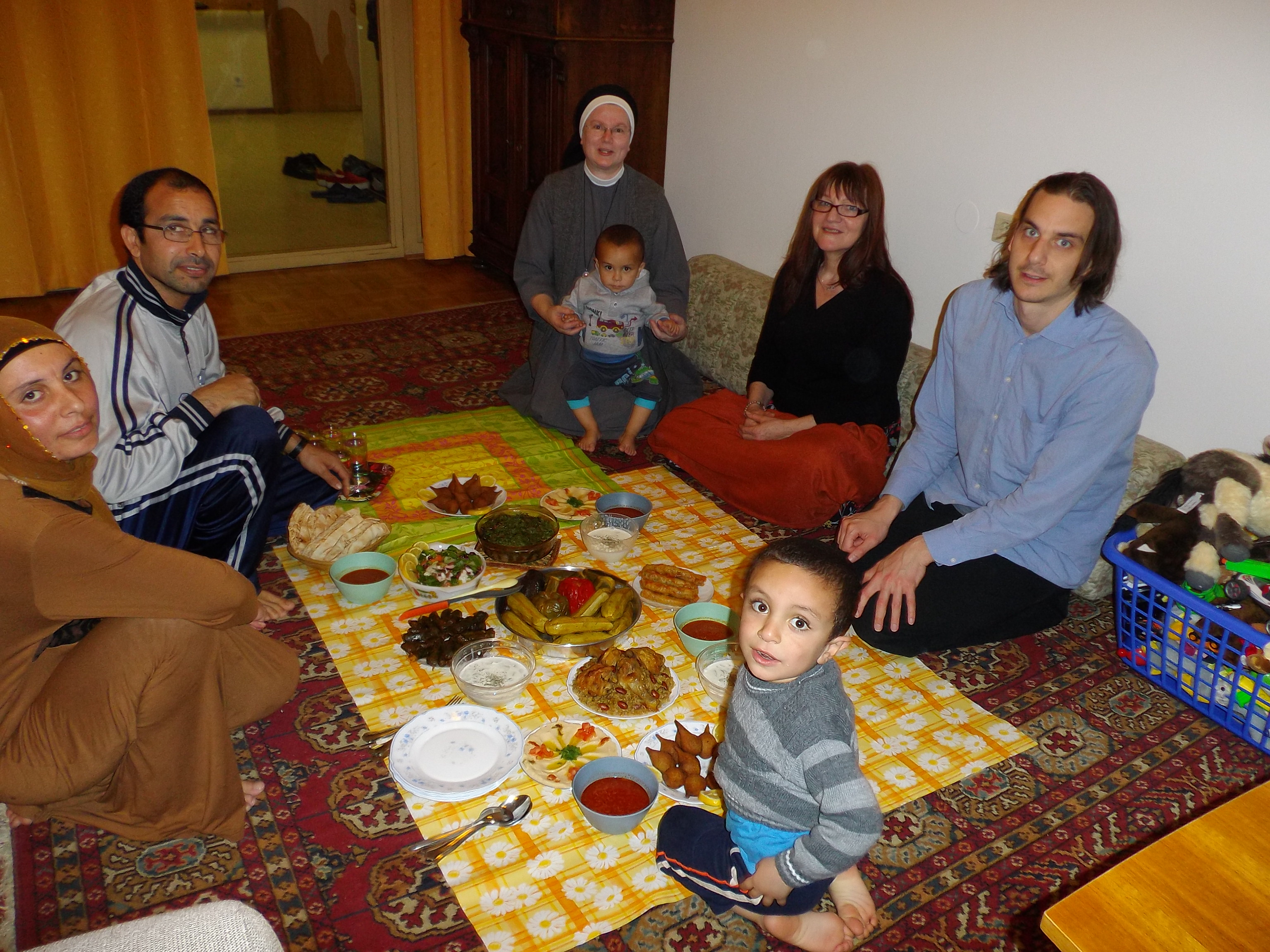 Four Muslims attended the summer Mariapolis, which coincided with the end of Ramadan and was celebrated by all with Arab music, dancing and Syrian sweets. During those days Mohamed learned of his mother’s death. It was a moving occasion to pray together for her and to recite some Psalms that respected everyone’s feelings. Trying to understand another person’s pain is also a form of dialogue. Mohamed then asked the Authorities for permission to reunite with his family in Austria, which turned out to be very complicated. His wife went on foot 22 times for 7 hours amidst cold, hunger and danger to the border – and was promptly sent back. Once she was even locked up in prison. But she finally managed to cross. Thus the long awaited family reunion drew nearer, but it was suggested that they settle in Vienna rather than Graz. Mohamed regretfully left his friends in Graz, unaware of the warm acceptance that would also receive amongst the Focolare community in the capital, which had been notified of his arrival. The community got busy finding a place for the family to live, which was not easy due to the scarcity of housing. They thought of some women religious friends who ran a home for the elderly. In just one day there was already a positive response thanks to a reassuring conversation with the Focolare members. So, now it’s been two months that Mohamed and his family have been living with the Catholic reverend sisters, without any inconvenience for either side: the sisters, acknowledging and respecting the customs of their Muslim guests and the family dwelling in a structure with many prominent Catholic signs. This is also part of dialogue and, as Mohamed declares: “Christians and Muslims, we’re truly brothers and sisters.”
Four Muslims attended the summer Mariapolis, which coincided with the end of Ramadan and was celebrated by all with Arab music, dancing and Syrian sweets. During those days Mohamed learned of his mother’s death. It was a moving occasion to pray together for her and to recite some Psalms that respected everyone’s feelings. Trying to understand another person’s pain is also a form of dialogue. Mohamed then asked the Authorities for permission to reunite with his family in Austria, which turned out to be very complicated. His wife went on foot 22 times for 7 hours amidst cold, hunger and danger to the border – and was promptly sent back. Once she was even locked up in prison. But she finally managed to cross. Thus the long awaited family reunion drew nearer, but it was suggested that they settle in Vienna rather than Graz. Mohamed regretfully left his friends in Graz, unaware of the warm acceptance that would also receive amongst the Focolare community in the capital, which had been notified of his arrival. The community got busy finding a place for the family to live, which was not easy due to the scarcity of housing. They thought of some women religious friends who ran a home for the elderly. In just one day there was already a positive response thanks to a reassuring conversation with the Focolare members. So, now it’s been two months that Mohamed and his family have been living with the Catholic reverend sisters, without any inconvenience for either side: the sisters, acknowledging and respecting the customs of their Muslim guests and the family dwelling in a structure with many prominent Catholic signs. This is also part of dialogue and, as Mohamed declares: “Christians and Muslims, we’re truly brothers and sisters.”
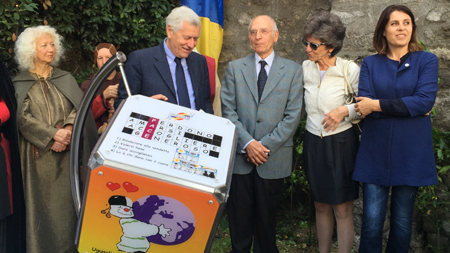
Jun 10, 2016 | Non categorizzato
 On June 4th the Porta della Verità Garden in Viterbo, Italy, was dedicated to Chiara Lubich, to show how her message of unity amongst peoples has been welcomed by the capital city of the Province of Viterbo. It is “a message of interculturalism,” one local newspaper writes in its large coverage of the event, “that when lived out is enriching because of its call for mutual respect of diversity.” The Porta della Verità Garden is a small plot of green just inside the city walls in the historic district of the city of Viterbo. The event was attended by many young students, several costumed characters in a historical parade, as well as city authorities: Mayor Leonardo Michelini and Bishop Lino Fumagalli. The Solidarity Dice project was promoted by the municipal council in 2014 and conceived and carried out by the Christian Associations of Italian Workers (ACLI) in collaboration with the L. Fantappiè Comprehensive Institute. “The idea behind this project was born through a trip to Trieste where saw the Solidarity Dice for the first time. We wanted it in our city because it is a concrete sign of solidarity. It was all achieved thanks to the collaboration from all sectors of the city administration,” explained Renzo Salvatori, president of ACLI in Viterbo. “Solidarity regards all of us,” Bishop Lino Fumagalli emphasized. “You can measure the growth of a society by the number of its works of solidarity. The sentences written on the sides of the dice warm the heart when they are implemented.” Some of the young participants recounted their own daily experiences with solidarity and explained what guided them in coming up with the sentences that were chosen for the Dice of Solidarity through an inter-mural competition with 120 entries. “The Dice of Solidarity is a project that gives meaning to the work of the school that begins inside the classrooms and continues after the final bell,” added Alessandro Ernestino from Fantappiè Institute. “The school is an important part of a community, capable of working on the environment together with the different associations like ACLI and the organizations of the administration. In his concluding remarks Mayor Leonardo Michelini said: “This day is a moment that enters into the history of the city. In the beginning the project didn’t seem to be doable, but the messages that the Dice of Solidarity transmits have universal value.” Sourcee: ViterboPost
On June 4th the Porta della Verità Garden in Viterbo, Italy, was dedicated to Chiara Lubich, to show how her message of unity amongst peoples has been welcomed by the capital city of the Province of Viterbo. It is “a message of interculturalism,” one local newspaper writes in its large coverage of the event, “that when lived out is enriching because of its call for mutual respect of diversity.” The Porta della Verità Garden is a small plot of green just inside the city walls in the historic district of the city of Viterbo. The event was attended by many young students, several costumed characters in a historical parade, as well as city authorities: Mayor Leonardo Michelini and Bishop Lino Fumagalli. The Solidarity Dice project was promoted by the municipal council in 2014 and conceived and carried out by the Christian Associations of Italian Workers (ACLI) in collaboration with the L. Fantappiè Comprehensive Institute. “The idea behind this project was born through a trip to Trieste where saw the Solidarity Dice for the first time. We wanted it in our city because it is a concrete sign of solidarity. It was all achieved thanks to the collaboration from all sectors of the city administration,” explained Renzo Salvatori, president of ACLI in Viterbo. “Solidarity regards all of us,” Bishop Lino Fumagalli emphasized. “You can measure the growth of a society by the number of its works of solidarity. The sentences written on the sides of the dice warm the heart when they are implemented.” Some of the young participants recounted their own daily experiences with solidarity and explained what guided them in coming up with the sentences that were chosen for the Dice of Solidarity through an inter-mural competition with 120 entries. “The Dice of Solidarity is a project that gives meaning to the work of the school that begins inside the classrooms and continues after the final bell,” added Alessandro Ernestino from Fantappiè Institute. “The school is an important part of a community, capable of working on the environment together with the different associations like ACLI and the organizations of the administration. In his concluding remarks Mayor Leonardo Michelini said: “This day is a moment that enters into the history of the city. In the beginning the project didn’t seem to be doable, but the messages that the Dice of Solidarity transmits have universal value.” Sourcee: ViterboPost

Jun 10, 2016 | Non categorizzato
 “Despite all his moving around in the world, his Roman and in some sense Vatican roots, his political patrolling and social outlook, Igino Giordani never really cut the umbilical cord with his own hometown. To grasp how much he had loved his Tivoli, it’s enough to scroll through some of his writings in which he tells of the place, or to read the novel “La città murata” (The Walled City) that’s set in Tivoli. In Memorie di un cristiano ingenuo (Memoirs of a naive Christian), he paints his hometown environment with words that betray this intense relationship and, in a sense, seem to justify his own basic choices as he assigns to them their own Tiburtine character: playful and untameable, courageous and consistent, aggressive at times but motivated by love for God and wisdom. Igino Giordani was born into a family of humble origins. He more than once expressed veneration for his parents, for the dignity with which they lived their daily lives and for the Catholic faith that marked the key stages of life. In Tivoli Giordani grew personally and also intellectually. He certainly didn’t have the opportunities that some other children with fine intelligence could had. In fact, his father geared him in the direction of manual labour as a mason worker. In the meantime, still a boy, he was fascinated by religious ceremonies and the celebration of the Mass even though they were in Latin. The little Giordani began to memorize some parts and, when he was alone even at work, instead of whistling some popular tune he would recite Latin parts of the Mass. Divine Providence made use of Sor Facchini (the contractor they worked for), who realized that Igino was not cut out for the cement bucket and trowel, but for school and book. Sor Facchini decided to finance Igino’s schooling at the Seminary of Tivoli, which at that time was the best place for shaping the intellect and spiritual life of a thirteen year-old boy. He remained there until 1912 when he should have moved to the Seminary of Anagni. But Igino decided to stay in Tivoli and attend classical high school from which he graduated in 1914. It’s likely that the passion for polished and effective argument about the intellectual basis of the Catholic faith was already engraved on Giordani’s life at an early age while listening to Jesuit Father Mancini at Saint Andrew Church in Tivoli. Giordani described the priest as a “compelling and unassailable man of the faith”. He spoke of Mancini as a man if irresistible and unattackable faith. He was a combative spreader of the Gospel; for Giordani he was a true role model. In this first phase of his upbringing we can already foresee several traits that would lead Giordani to assert himself as a debater and defender of the faith. Shortly after his graduation from high school, Italy also entered the War. Igino faced Italian public life that was in the midst of a controversial debate over war and peace, as a resolute pacifist at a time when pacifist ideas were not easy to support. It is likely that thanks to the charismatic figure of Father Mancini, the solid experience of the faith in seminary and the pluralistic political ideology that was breathed in high school, Giordani – who even in those years seemed to have grown tepid from a religious point of view – had never lost the sense of love of neighbour, which led him to dismiss all forms of violence towards all human beings. A few years later he would say so himself with shining simplicity as he expressed his distaste for battle during those years of war: “When I was on watch in the trenches during the First World War thoughts of the divine commandment tortured me: ‘Fifth: Do not kill.” He had been raised in Tivoli where he had been trained in peace. And in a song written by Giordani many years later, steeped in the devastating experience of war but also of faith and hope born from the encounter with the spirituality of unity: Contempt for man and his depreciation derive from the fact that we no longer see Christ in him; and so love is substituted by hatred, which is the spirituality of the prince of death. Alberto Lo Presti See: Igino Giordani, La divina avventura (Rome: Città Nuova, 1993), p. 141.
“Despite all his moving around in the world, his Roman and in some sense Vatican roots, his political patrolling and social outlook, Igino Giordani never really cut the umbilical cord with his own hometown. To grasp how much he had loved his Tivoli, it’s enough to scroll through some of his writings in which he tells of the place, or to read the novel “La città murata” (The Walled City) that’s set in Tivoli. In Memorie di un cristiano ingenuo (Memoirs of a naive Christian), he paints his hometown environment with words that betray this intense relationship and, in a sense, seem to justify his own basic choices as he assigns to them their own Tiburtine character: playful and untameable, courageous and consistent, aggressive at times but motivated by love for God and wisdom. Igino Giordani was born into a family of humble origins. He more than once expressed veneration for his parents, for the dignity with which they lived their daily lives and for the Catholic faith that marked the key stages of life. In Tivoli Giordani grew personally and also intellectually. He certainly didn’t have the opportunities that some other children with fine intelligence could had. In fact, his father geared him in the direction of manual labour as a mason worker. In the meantime, still a boy, he was fascinated by religious ceremonies and the celebration of the Mass even though they were in Latin. The little Giordani began to memorize some parts and, when he was alone even at work, instead of whistling some popular tune he would recite Latin parts of the Mass. Divine Providence made use of Sor Facchini (the contractor they worked for), who realized that Igino was not cut out for the cement bucket and trowel, but for school and book. Sor Facchini decided to finance Igino’s schooling at the Seminary of Tivoli, which at that time was the best place for shaping the intellect and spiritual life of a thirteen year-old boy. He remained there until 1912 when he should have moved to the Seminary of Anagni. But Igino decided to stay in Tivoli and attend classical high school from which he graduated in 1914. It’s likely that the passion for polished and effective argument about the intellectual basis of the Catholic faith was already engraved on Giordani’s life at an early age while listening to Jesuit Father Mancini at Saint Andrew Church in Tivoli. Giordani described the priest as a “compelling and unassailable man of the faith”. He spoke of Mancini as a man if irresistible and unattackable faith. He was a combative spreader of the Gospel; for Giordani he was a true role model. In this first phase of his upbringing we can already foresee several traits that would lead Giordani to assert himself as a debater and defender of the faith. Shortly after his graduation from high school, Italy also entered the War. Igino faced Italian public life that was in the midst of a controversial debate over war and peace, as a resolute pacifist at a time when pacifist ideas were not easy to support. It is likely that thanks to the charismatic figure of Father Mancini, the solid experience of the faith in seminary and the pluralistic political ideology that was breathed in high school, Giordani – who even in those years seemed to have grown tepid from a religious point of view – had never lost the sense of love of neighbour, which led him to dismiss all forms of violence towards all human beings. A few years later he would say so himself with shining simplicity as he expressed his distaste for battle during those years of war: “When I was on watch in the trenches during the First World War thoughts of the divine commandment tortured me: ‘Fifth: Do not kill.” He had been raised in Tivoli where he had been trained in peace. And in a song written by Giordani many years later, steeped in the devastating experience of war but also of faith and hope born from the encounter with the spirituality of unity: Contempt for man and his depreciation derive from the fact that we no longer see Christ in him; and so love is substituted by hatred, which is the spirituality of the prince of death. Alberto Lo Presti See: Igino Giordani, La divina avventura (Rome: Città Nuova, 1993), p. 141.
![Best wishes for Ramadan]()
Jun 9, 2016 | Non categorizzato
 “May glory be upon you my Lord, He who is the Adored One, the One to be adored, the Eternal One, who existed from all times, who loves us, whose Mercy and Power embrace the universe (…). You are the Adored One, Oh Lord, You are the Master who loves and forgives. Your forgiveness and Your mercy are infinite, Oh Lord, You help those who are afflicted, the Consoler in every grief, the Refuge for those whose heart is broken.” (From a prayer by Ali ibn Abi Talib, cousin and son-in-law of the Islamic prophet Muhammad)
“May glory be upon you my Lord, He who is the Adored One, the One to be adored, the Eternal One, who existed from all times, who loves us, whose Mercy and Power embrace the universe (…). You are the Adored One, Oh Lord, You are the Master who loves and forgives. Your forgiveness and Your mercy are infinite, Oh Lord, You help those who are afflicted, the Consoler in every grief, the Refuge for those whose heart is broken.” (From a prayer by Ali ibn Abi Talib, cousin and son-in-law of the Islamic prophet Muhammad)

Jun 9, 2016 | Focolare Worldwide
 The spacious “Knowledge Sharing Centre” Hall of the John Paul II Catholic University of Lublin hosted a Conflicts, Dialogue and Culture of Unity Conference , June 3-4, 2016. The conference was meant to promote the transmission of knowledge through academic dialogue amongst 180 people, including scholars and professors from a variety of academic fields of the social sciences. Ninety five interactive presentations were given that included discussions, questions and answers, as well as requests for sharing research efforts. It was a gift shared amongst different specializations, but also amongst generations and geographic regions of Europe, and it was open to the challenges of the whole world. The conference that opened with Jesús Morán’s presentation titled “The Culture of Unity and the great challenges of humanity today” was motivated by the 20th anniversary of the conferral of the honorary doctorate in Social Sciences to Chiara Lubich, by the Catholic University of Lublin in June 1996. The conferral speech by Professor Adam Biela explained the motivation: The charism of unity “is a concrete and practical actualization of a new vision of social, economic, political, educational structures and of religious relations. It guides, recommends, suggests, teaches and promotes unity” among people. Biela grasped in the revolutionary inspiration of Chiara Lubich that began to manifest itself in the 1940s, the elements of a new paradigm for the social sciences, which led him to coin the unprecedented term: paradigm of unity. The event, 20 years later, in Lublin was “a complex and interesting” meeting, according to Professor Italo Fiorin, president of the graduate school of Formation Science at LUMSA University in Rome, Italy. “. . . especially because of the title, which connects three words: Conflict – reflecting on the not catastrophic but problematic situation of the world that calls for a sense of responsibility. Dialogue: as the path that leads to and changes conflict into something else through positive action. Unity: as the result of a dialogue that is not expressed in reaching a single way of thinking, but of reaching a greater awareness of one’s own identity.” “For 200 to 300 years knowledge has been divided into fields,” says neuro-scientist Catherine Belzung from the University of Tours, France. “But the actual fragmentation prevents progress from being made. The time of interdisciplinary dialogue has arrived. Chiara Lubich’s thought seems to me the paradigm to keep before us when we are interested in interdisciplinary research, because it’s a Trinitarian paradigm: Each field remains distinct, but must have within it the knowledge of the other disciplines in order to be transformed and, in this way, continue the dialogue. I think that the unity and distinction model that is already being proposed in the spiritual field can be very easily transferred to the field of interdisciplinary dialogue.” Professor Marek Rembierz, pedagogue from the University of Silesia, Katowice, Poland, remarked: “It turned out very interesting for me to think on an interdisciplinary plane. And it took quite a change in mentality: modifying the language of science and culture with the language of the heart. It was a source of inspiration for the participants and could also be so for the social life of individuals. Gianvittorio Caprara, full professor of psychology and social neurosciences at Sapienza University in Rome: “Chiara Lubich had some particularly good and fertile intuitions; fertile because they inspired a work, a movement; now they inspire this conference and other research. It’s ongoing reflection that becomes inspiration. One particular discovery for me was the deep significance of the concept of fraternity, precisely in a society like ours that seriously risks not having brothers and sisters anymore. I encourage the Focolare to insist even more on the systematic research of knowledge so that the action can be even more transformative and efficacious.” “With regard to fraternity,” Fiorin says, “Professor Stefano Zamagni worked on a fascinating point in his presentation on the Economy of Communion and even referred it to politics. I believe that such a reading is also applicable to education, to inspire the education and teaching connection and to lead to important educational solutions. It’s a terrain that merits exploring, to which I intend to devote my attention.” The closing session of the conference was entrusted to Professor Biela, Daniela Ropelato, vice-president of Sophia University Institute (IUS) and Renata Simon from the International Focolare Centre in Rocca di Papa, Italy. A thought from Chiara Lubich offered some powerful guidelines to give continuity to the interdisciplinary dialogue that permeated the conference: “In order to welcome [God’s] All within you, you need to be the nothingness of Jesus Forsaken. (. . .) You have to place yourself in front of everyone in a learning position, because you really do have something to learn. And only nothingness gathers all and holds it tightly to itself in unity.” It was an encouragement that was unanimously accepted: to collaborate, with competence, wisdom and an ability to dialogue even on the academic plane.
The spacious “Knowledge Sharing Centre” Hall of the John Paul II Catholic University of Lublin hosted a Conflicts, Dialogue and Culture of Unity Conference , June 3-4, 2016. The conference was meant to promote the transmission of knowledge through academic dialogue amongst 180 people, including scholars and professors from a variety of academic fields of the social sciences. Ninety five interactive presentations were given that included discussions, questions and answers, as well as requests for sharing research efforts. It was a gift shared amongst different specializations, but also amongst generations and geographic regions of Europe, and it was open to the challenges of the whole world. The conference that opened with Jesús Morán’s presentation titled “The Culture of Unity and the great challenges of humanity today” was motivated by the 20th anniversary of the conferral of the honorary doctorate in Social Sciences to Chiara Lubich, by the Catholic University of Lublin in June 1996. The conferral speech by Professor Adam Biela explained the motivation: The charism of unity “is a concrete and practical actualization of a new vision of social, economic, political, educational structures and of religious relations. It guides, recommends, suggests, teaches and promotes unity” among people. Biela grasped in the revolutionary inspiration of Chiara Lubich that began to manifest itself in the 1940s, the elements of a new paradigm for the social sciences, which led him to coin the unprecedented term: paradigm of unity. The event, 20 years later, in Lublin was “a complex and interesting” meeting, according to Professor Italo Fiorin, president of the graduate school of Formation Science at LUMSA University in Rome, Italy. “. . . especially because of the title, which connects three words: Conflict – reflecting on the not catastrophic but problematic situation of the world that calls for a sense of responsibility. Dialogue: as the path that leads to and changes conflict into something else through positive action. Unity: as the result of a dialogue that is not expressed in reaching a single way of thinking, but of reaching a greater awareness of one’s own identity.” “For 200 to 300 years knowledge has been divided into fields,” says neuro-scientist Catherine Belzung from the University of Tours, France. “But the actual fragmentation prevents progress from being made. The time of interdisciplinary dialogue has arrived. Chiara Lubich’s thought seems to me the paradigm to keep before us when we are interested in interdisciplinary research, because it’s a Trinitarian paradigm: Each field remains distinct, but must have within it the knowledge of the other disciplines in order to be transformed and, in this way, continue the dialogue. I think that the unity and distinction model that is already being proposed in the spiritual field can be very easily transferred to the field of interdisciplinary dialogue.” Professor Marek Rembierz, pedagogue from the University of Silesia, Katowice, Poland, remarked: “It turned out very interesting for me to think on an interdisciplinary plane. And it took quite a change in mentality: modifying the language of science and culture with the language of the heart. It was a source of inspiration for the participants and could also be so for the social life of individuals. Gianvittorio Caprara, full professor of psychology and social neurosciences at Sapienza University in Rome: “Chiara Lubich had some particularly good and fertile intuitions; fertile because they inspired a work, a movement; now they inspire this conference and other research. It’s ongoing reflection that becomes inspiration. One particular discovery for me was the deep significance of the concept of fraternity, precisely in a society like ours that seriously risks not having brothers and sisters anymore. I encourage the Focolare to insist even more on the systematic research of knowledge so that the action can be even more transformative and efficacious.” “With regard to fraternity,” Fiorin says, “Professor Stefano Zamagni worked on a fascinating point in his presentation on the Economy of Communion and even referred it to politics. I believe that such a reading is also applicable to education, to inspire the education and teaching connection and to lead to important educational solutions. It’s a terrain that merits exploring, to which I intend to devote my attention.” The closing session of the conference was entrusted to Professor Biela, Daniela Ropelato, vice-president of Sophia University Institute (IUS) and Renata Simon from the International Focolare Centre in Rocca di Papa, Italy. A thought from Chiara Lubich offered some powerful guidelines to give continuity to the interdisciplinary dialogue that permeated the conference: “In order to welcome [God’s] All within you, you need to be the nothingness of Jesus Forsaken. (. . .) You have to place yourself in front of everyone in a learning position, because you really do have something to learn. And only nothingness gathers all and holds it tightly to itself in unity.” It was an encouragement that was unanimously accepted: to collaborate, with competence, wisdom and an ability to dialogue even on the academic plane.
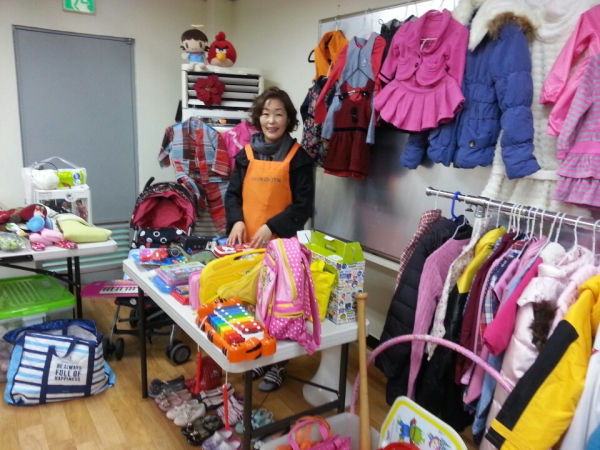
Jun 8, 2016 | Non categorizzato
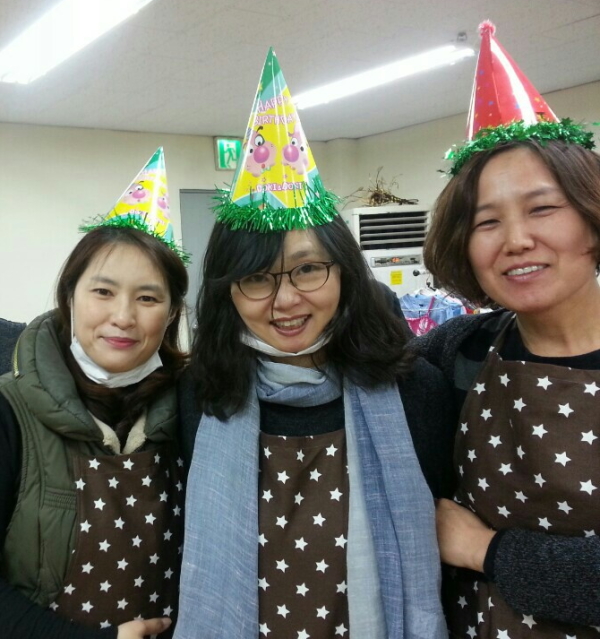 Seongnam, South Korea, more than a million inhabitants on the southeastern outskirts of Seoul, is a growing city with the presence of large companies that further the economic development of the area in a city where there is great wealth alongside abject poverty. “In Korea there is a strong immigration of women from several Asian countries: China, Vietnam, Cambodia, Japan, and more. They come here to marry or to escape from misery. Hence, the many multi-cultural families, most of them living in the poor areas of our city,” explains a Focolare group from Korea who were attending the OnCity international conference in Castelgandolfo, Italy. One of their greatest needs is integration.
Seongnam, South Korea, more than a million inhabitants on the southeastern outskirts of Seoul, is a growing city with the presence of large companies that further the economic development of the area in a city where there is great wealth alongside abject poverty. “In Korea there is a strong immigration of women from several Asian countries: China, Vietnam, Cambodia, Japan, and more. They come here to marry or to escape from misery. Hence, the many multi-cultural families, most of them living in the poor areas of our city,” explains a Focolare group from Korea who were attending the OnCity international conference in Castelgandolfo, Italy. One of their greatest needs is integration. 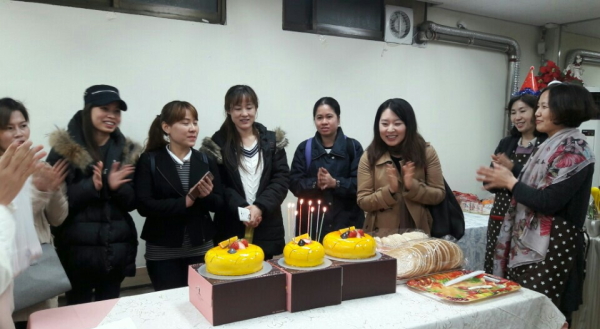 In the Multicultural Centre where some of the Focolare members work, they teach women immigrants to speak Korean, and have proposed establishing some kind of child care programme to entertain the children while their mothers learn the new language. “But at one point the government funding was removed and we couldn’t continue with our activity,” they say. “We told some friends who share our commitment in living ideals of unity and peace in our city. Each one of them gave what they could: time, skills – taking on the problems and situations of many people.” They were faced with truly painful situations: settling in a new country is not easy. For many, the Centre was a place where they could catch their breath, a place where they could share one another’s problems, especially financial problems.
In the Multicultural Centre where some of the Focolare members work, they teach women immigrants to speak Korean, and have proposed establishing some kind of child care programme to entertain the children while their mothers learn the new language. “But at one point the government funding was removed and we couldn’t continue with our activity,” they say. “We told some friends who share our commitment in living ideals of unity and peace in our city. Each one of them gave what they could: time, skills – taking on the problems and situations of many people.” They were faced with truly painful situations: settling in a new country is not easy. For many, the Centre was a place where they could catch their breath, a place where they could share one another’s problems, especially financial problems.  In 2012 we opened a small market where you could buy what you needed at a low cost. We called this small temporary project: The Mary of Nazareth Project. Many people helped us by donating clothing, toys, office supplies and linens.” What could be done with the small sum of around 353 Euros? “We decided to follow the Economy of Communion approach of distributing the profits: 1/3 for a family (a Cambodian family that our community had taken into its care until they could stand on their own); 1/3 to buy any additional things they might need; 1/3 for everyone in the group (to celebrate the birthdays of immigrants who didn’t have families with them). Finally, the Maria Market recived a donation from the government and the Centre decided to remodel the shop. But it was only reopened in 2014 after much expectation. The following year, they received a visit from the Mayor. In June 2015, with the spread of Mers in Korea, 2,900 schools were closed and 4,000 people were placed in isolation. Like many public locations the Centre also had to close. However, during the period of the shut-down, “we visited people in their homes and supported them in the little things. In the end, the Centre gave us a “Thank You” plaque. Now Maria Market is open again and always developing new ideas like mail delivery service for long distance customers. For the group running the project it continues to be “a concrete experience of answering the needs of our neediest sisters and brothers.”
In 2012 we opened a small market where you could buy what you needed at a low cost. We called this small temporary project: The Mary of Nazareth Project. Many people helped us by donating clothing, toys, office supplies and linens.” What could be done with the small sum of around 353 Euros? “We decided to follow the Economy of Communion approach of distributing the profits: 1/3 for a family (a Cambodian family that our community had taken into its care until they could stand on their own); 1/3 to buy any additional things they might need; 1/3 for everyone in the group (to celebrate the birthdays of immigrants who didn’t have families with them). Finally, the Maria Market recived a donation from the government and the Centre decided to remodel the shop. But it was only reopened in 2014 after much expectation. The following year, they received a visit from the Mayor. In June 2015, with the spread of Mers in Korea, 2,900 schools were closed and 4,000 people were placed in isolation. Like many public locations the Centre also had to close. However, during the period of the shut-down, “we visited people in their homes and supported them in the little things. In the end, the Centre gave us a “Thank You” plaque. Now Maria Market is open again and always developing new ideas like mail delivery service for long distance customers. For the group running the project it continues to be “a concrete experience of answering the needs of our neediest sisters and brothers.”

 The crisis of the refugees in Europe, along with its figures, the number of deaths, and the closed frontiers, is awaiting the world’s response, as well as that of many generous people. The news from Indonesia comes as the answer of the Youth for a United World in the city of Medan, Indonesia (four million inhabitants). “We could not turn a deaf ear to the refugees camped in Greece, and we wanted to do something concrete for them. So we decided to plan our United World Week 2016 by organizing a concert to gather funds for them. It was our way of giving strong affirmation that peace is possible and starts from each of us, with concrete actions.” “We had two weeks to prepare the event, which was not much, but we thought that we would succeed if we worked hard, forgetting our fatigue and economic difficulties. To cover the organisational expenses we sang even in restaurants. But God’s Providence came to our aid and we managed to pay for the lease of a hall, part of the sound system and other items.” “When I saw all those young people in the audience – says Ika – I tried not to think of myself but of the refugees, and took courage. “From the technical viewpoint – some confessed with great simplicity – «we made so many mistakes, but the atmosphere of enthusiasm and joy of the 350 participants convinced us that it was all worth the while!” Even a choir of four singers of a Catholic University wanted to contribute to the peace concert.” “The proceeds of € 600 correspond to three or four months’ basic salary in Indonesia, which is not much, but we were so happy that we managed to give our drop of help for our brethren in difficulty.” “It was an extraordinary experience – stressed Randi – I strongly felt that the differences in religions and ethnic groups are in reality very meaningful. I hope that many hearts have been touched and start loving with concrete gestures.” “On a wall poster entitled “Let’s bridge,” the participants signed up with their commitment to build peace.”
The crisis of the refugees in Europe, along with its figures, the number of deaths, and the closed frontiers, is awaiting the world’s response, as well as that of many generous people. The news from Indonesia comes as the answer of the Youth for a United World in the city of Medan, Indonesia (four million inhabitants). “We could not turn a deaf ear to the refugees camped in Greece, and we wanted to do something concrete for them. So we decided to plan our United World Week 2016 by organizing a concert to gather funds for them. It was our way of giving strong affirmation that peace is possible and starts from each of us, with concrete actions.” “We had two weeks to prepare the event, which was not much, but we thought that we would succeed if we worked hard, forgetting our fatigue and economic difficulties. To cover the organisational expenses we sang even in restaurants. But God’s Providence came to our aid and we managed to pay for the lease of a hall, part of the sound system and other items.” “When I saw all those young people in the audience – says Ika – I tried not to think of myself but of the refugees, and took courage. “From the technical viewpoint – some confessed with great simplicity – «we made so many mistakes, but the atmosphere of enthusiasm and joy of the 350 participants convinced us that it was all worth the while!” Even a choir of four singers of a Catholic University wanted to contribute to the peace concert.” “The proceeds of € 600 correspond to three or four months’ basic salary in Indonesia, which is not much, but we were so happy that we managed to give our drop of help for our brethren in difficulty.” “It was an extraordinary experience – stressed Randi – I strongly felt that the differences in religions and ethnic groups are in reality very meaningful. I hope that many hearts have been touched and start loving with concrete gestures.” “On a wall poster entitled “Let’s bridge,” the participants signed up with their commitment to build peace.”

 Pastor of Mercy “To begin the Year of Mercy with a concrete gesture, I asked forgiveness of the members of my parish in case they didn’t always feel loved by me, and I invited them – those who wanted to – to come up and shake hands with me as a sign of our agreement to see each other with new eyes. A long queue was formed, and I was able to exchange a few words with every person. The next day, a parishioner who had not been there came to ask me if I would repeat the gesture because it had touched so many people in the village that it was still having lots of consequences.” (I. S.
Pastor of Mercy “To begin the Year of Mercy with a concrete gesture, I asked forgiveness of the members of my parish in case they didn’t always feel loved by me, and I invited them – those who wanted to – to come up and shake hands with me as a sign of our agreement to see each other with new eyes. A long queue was formed, and I was able to exchange a few words with every person. The next day, a parishioner who had not been there came to ask me if I would repeat the gesture because it had touched so many people in the village that it was still having lots of consequences.” (I. S. 
 “Cochabamba is really the heart of the country, the fourth largest city of
“Cochabamba is really the heart of the country, the fourth largest city of 


 Four Muslims attended the summer
Four Muslims attended the summer 

 “May glory be upon you my Lord, He who is the Adored One, the One to be adored, the Eternal One, who existed from all times, who loves us, whose Mercy and Power embrace the universe (…). You are the Adored One, Oh Lord, You are the Master who loves and forgives. Your forgiveness and Your mercy are infinite, Oh Lord, You help those who are afflicted, the Consoler in every grief, the Refuge for those whose heart is broken.” (From a prayer by Ali ibn Abi Talib, cousin and son-in-law of the Islamic prophet Muhammad)
“May glory be upon you my Lord, He who is the Adored One, the One to be adored, the Eternal One, who existed from all times, who loves us, whose Mercy and Power embrace the universe (…). You are the Adored One, Oh Lord, You are the Master who loves and forgives. Your forgiveness and Your mercy are infinite, Oh Lord, You help those who are afflicted, the Consoler in every grief, the Refuge for those whose heart is broken.” (From a prayer by Ali ibn Abi Talib, cousin and son-in-law of the Islamic prophet Muhammad)


